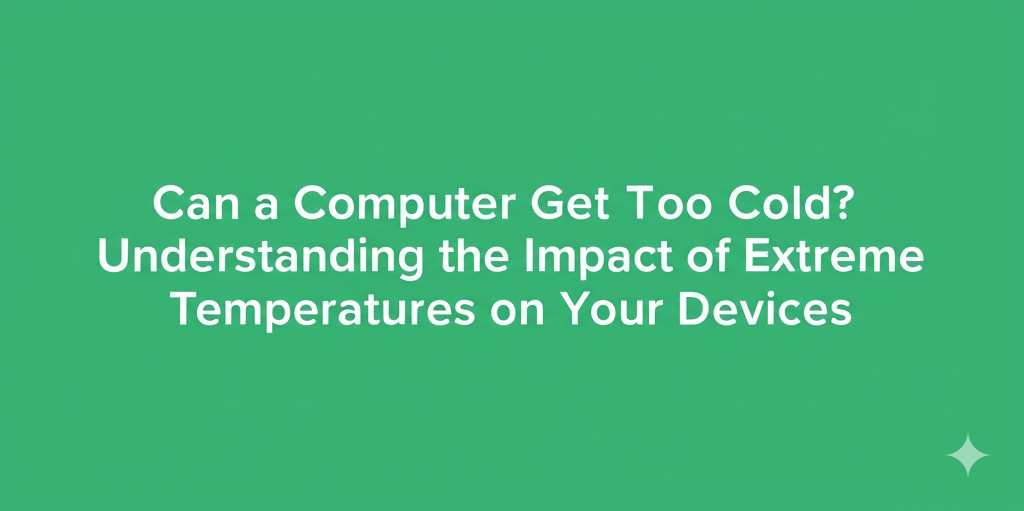In today’s world, computers are essential for both work and leisure, whether you’re running a business from home or simply enjoying a movie night. But just like we take care to protect our devices from extreme heat, it’s easy to overlook the potential damage caused by cold temperatures. Can a computer get too cold? The short answer is yes, and in this article, we’ll explore why cold can negatively impact your computer and how you can protect it.
The Effects of Cold on Computer Components
When most people think of computer damage, they often associate it with overheating or hardware failure due to excess heat. However, extreme cold can be just as detrimental to your device. Here’s how it works:
1. Condensation Risk
One of the biggest dangers of cold temperatures is the risk of condensation. When a computer is exposed to cold air, the internal components can cool rapidly. If the device is then brought into a warmer environment, the sudden temperature shift causes condensation to form inside the machine. This moisture can cause short circuits and, in the worst-case scenario, irreversible damage to your device.
2. Hard Drive Problems
Older hard drives, particularly those using spinning disks (HDDs), are vulnerable to cold temperatures. Low temperatures can cause the lubricants in the drive’s mechanical components to thicken, making it harder for the parts to move. This can lead to slower performance or, in extreme cases, a failure to boot up at all.
3. Battery Degradation
Cold temperatures also affect your computer’s battery. Lithium-ion batteries, commonly found in laptops and smartphones, tend to perform poorly in cold conditions. In extreme cold, the battery’s chemical reactions slow down, reducing its efficiency and lifespan. It can even cause the battery to stop charging or drain faster than usual.
4. Display Issues
Cold weather can also cause display issues, particularly for LCD screens. The liquid crystals inside the screen can react poorly to extremely cold temperatures, leading to screen malfunctions like slow response times, discoloration, or even permanent damage in extreme cases.
How Cold Affects Different Types of Computers
Not all computers are created equal when it comes to temperature tolerance. The way cold affects your device depends on its type and design.
Laptops and Portable Devices
Laptops, tablets, and smartphones are particularly susceptible to the effects of cold because they are more likely to be exposed to extreme weather conditions. Whether you’re working outdoors in winter or leaving your device in a cold car, it’s important to keep in mind that portable devices don’t have the same level of internal protection as desktops.
Tips to protect laptops in the cold:
- Always store your device in a case to prevent direct exposure to cold air.
- Allow your laptop to warm up gradually before powering it on if it has been in a cold environment.
- Avoid using your laptop while it’s still cold, as condensation may occur.
Desktops and Gaming PCs
Desktops and gaming PCs are generally better insulated than laptops, but they still face risks when exposed to extreme cold. While their larger size may offer more protection from condensation, the hard drives, processors, and other components are still susceptible to issues like freezing.
Protecting desktops from cold weather:
- Keep desktops in well-heated rooms.
- Ensure your device is stored in an area with stable temperatures.
- Use a surge protector to shield against power fluctuations when transitioning from cold to warm environments.
Servers and Workstations
Servers and industrial-grade workstations are typically built to withstand a wider range of temperatures, but even they can suffer from issues if they are not stored in climate-controlled environments. These machines tend to have more sophisticated cooling systems, but they still need to be kept within optimal operating conditions.
How to Prevent Cold-Related Damage to Your Computer
Preventing damage from extreme cold is essential, especially if you live in areas prone to harsh winters. Here are some practical tips:
1. Keep Computers in Temperature-Controlled Environments
The most effective way to protect your device from the cold is to keep it in a room with consistent temperature control. Avoid storing your computer in unheated garages or basements during winter.
2. Store Devices Properly
When you’re not using your computer, store it in a protective case or bag that shields it from temperature extremes. Also, when moving devices from one environment to another, allow them to acclimatize to the new temperature before using them.
3. Don’t Rush to Turn On a Cold Computer
If you’ve brought your computer inside after being exposed to the cold, don’t rush to power it on. Allow it to warm up to room temperature gradually. This will help prevent condensation from forming inside the device, which can cause long-term damage.
4. Use Laptop Covers and Sleeves
Investing in a good-quality laptop sleeve or cover can provide extra insulation against the cold, especially if you’re frequently moving your laptop outdoors.
5. Invest in a Cooling or Heating Pad
If you’re using your computer in an environment where temperature extremes are common, consider investing in cooling pads or heating pads designed specifically for your device. These can help maintain a stable temperature range for your laptop or desktop.
Conclusion: Can Cold Be a Threat to Your Computer?
While most people are aware of the risks posed by excessive heat, it’s clear that cold temperatures can be just as harmful to your computer. From condensation risks to potential damage to hard drives and batteries, extreme cold can lead to performance issues and even permanent harm to your device.
To protect your valuable technology, always ensure that your computer is stored in a temperature-controlled environment and avoid sudden temperature changes. Whether you’re using a laptop in a chilly café or keeping your gaming rig in a cold room, taking a few simple precautions can go a long way in maintaining the health and longevity of your device.
If you’re experiencing any cold-related issues with your computer, don’t hesitate to seek professional advice. Keeping your devices safe from extreme temperatures will help them perform at their best for years to come.

Caleb Carlson is a contributing writer at Computer Site Engineering, specializing in computer technology, software trends, and hardware innovations. His articles simplify complex tech topics, making them accessible to readers of all levels.





